
Welcome back!
Ready to check out?
You're just one click away from fantastic style and even better savings!
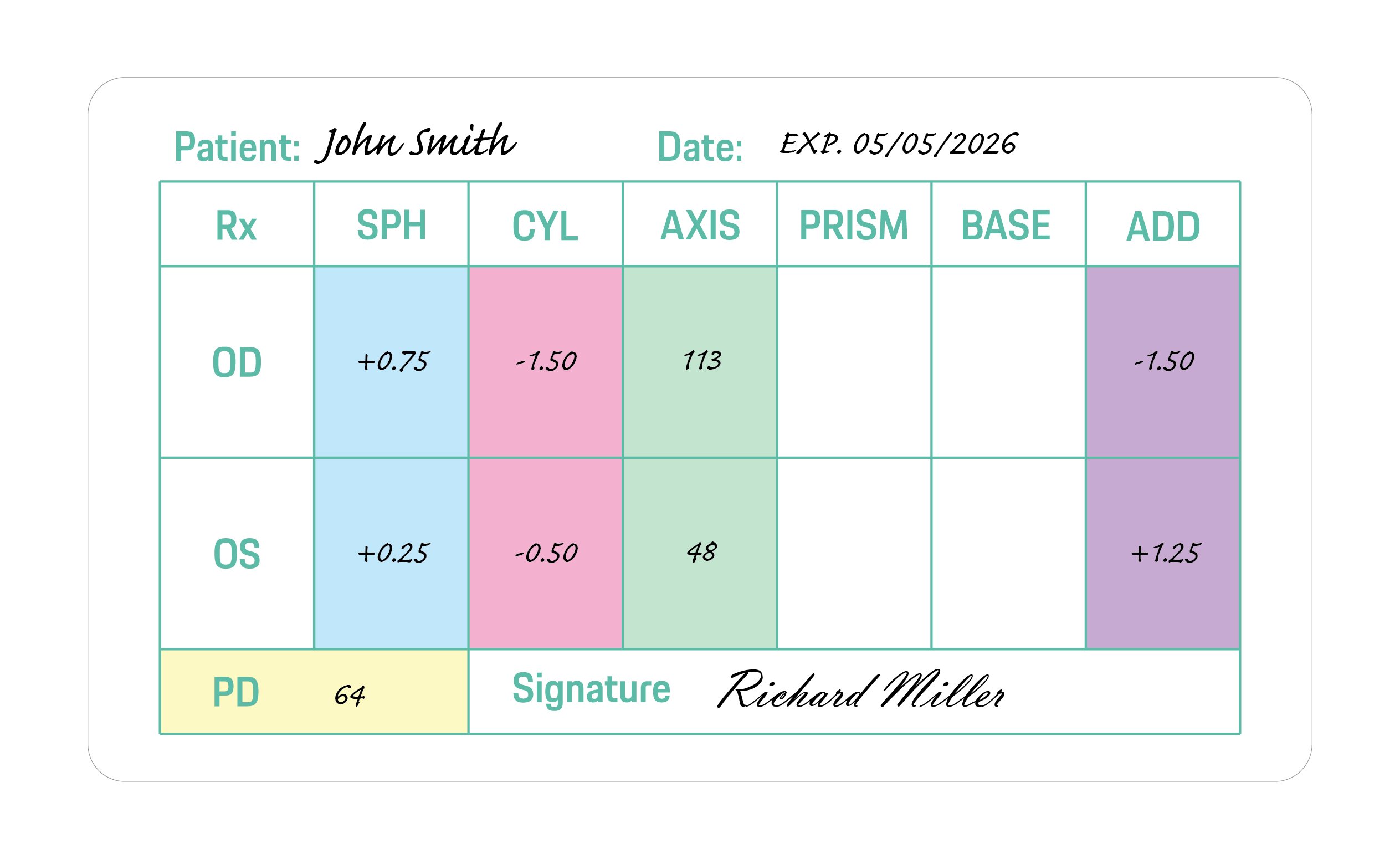
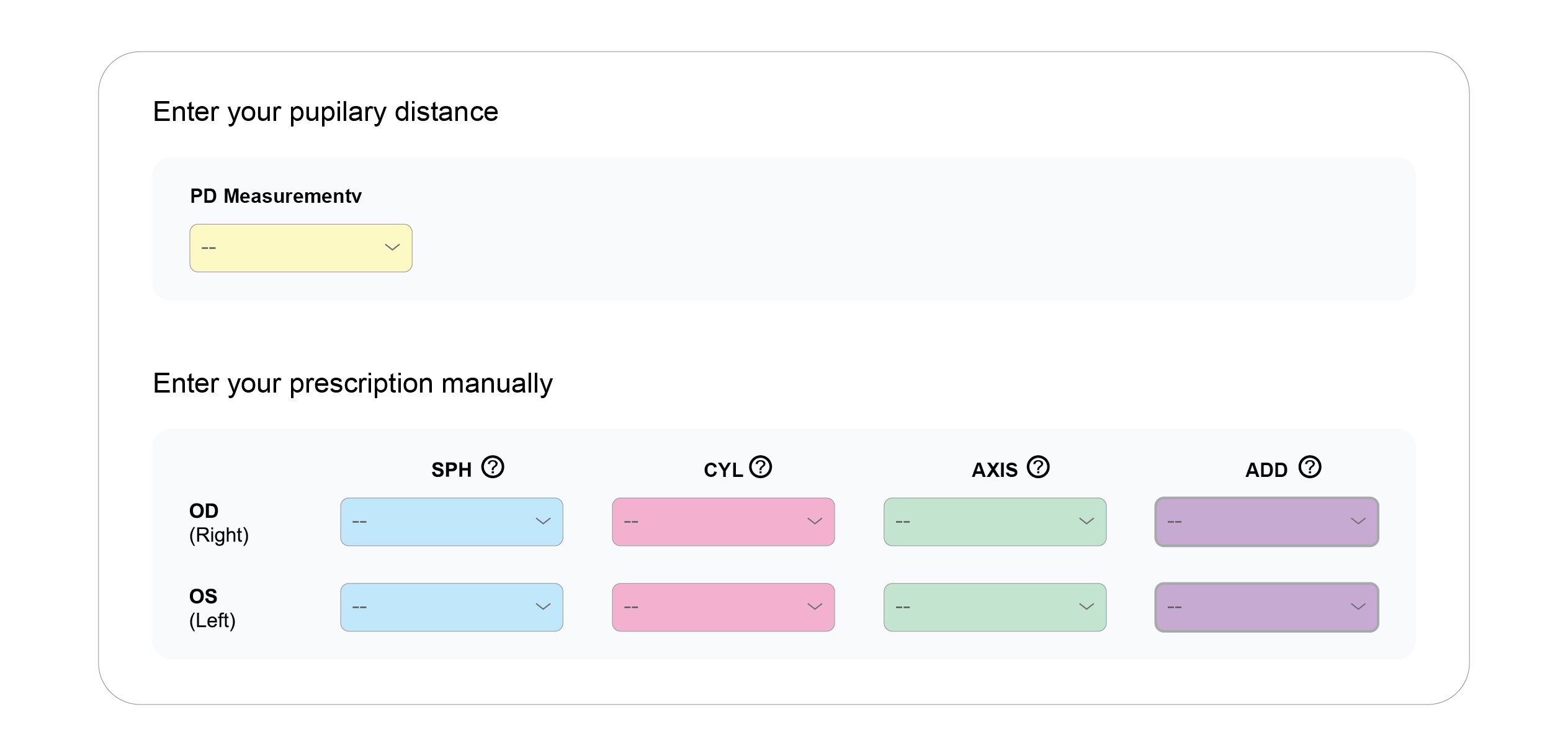
OD is an abbreviation for the Latin term oculus dexter which means right eye. Notice that the right eye information is asked for first even though we typically read from left to right.
OS is an abbreviation of the Latin oculus sinister which means left eye. That will be referenced on the far right column of the prescription.
SPH is short for sphere. The sphere of your prescription indicates the power on the lenses that is needed to see clearly. A plus (+) symbol indicates the eyeglass wearer is farsighted. A minus (-) symbol indicates that the eyeglass wearer is nearsighted.
CYL is short for cylinder. The cylinder indicates the lens power necessary to correct astigmatism. If the column has no value (is blank), it indicates that the eyeglass wearer does not have astigmatism. If this is the case on your prescription, you can leave it blank when entering it in.
AXIS is a prescription will include an axis value for those with astigmatism. This number represents the angle of the lens that shouldn't feature a cylinder power to help correct your astigmatism.
ADD is short for "additional correction." This is where details about bifocals, multifocal lenses or progressive lenses would appear.
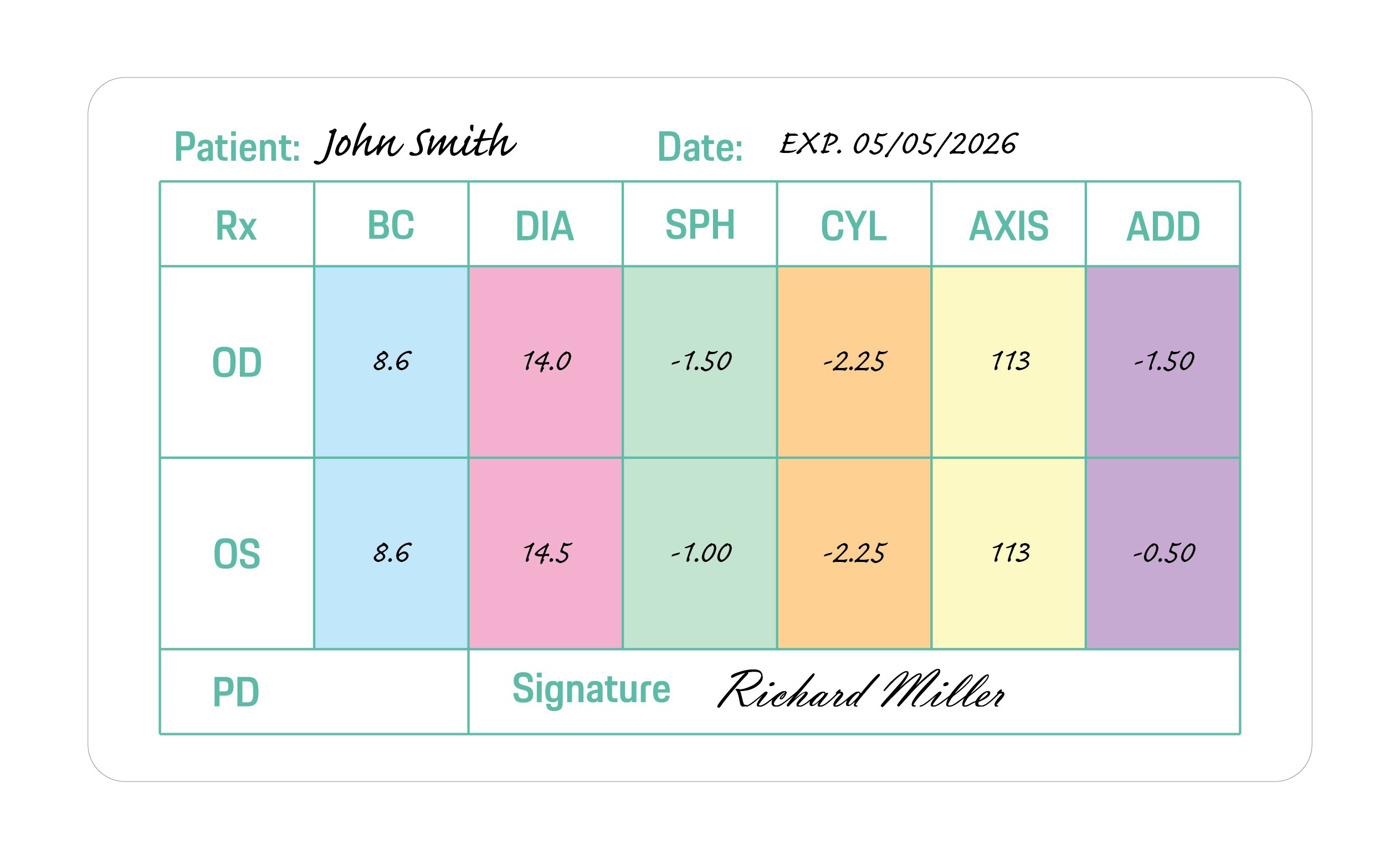
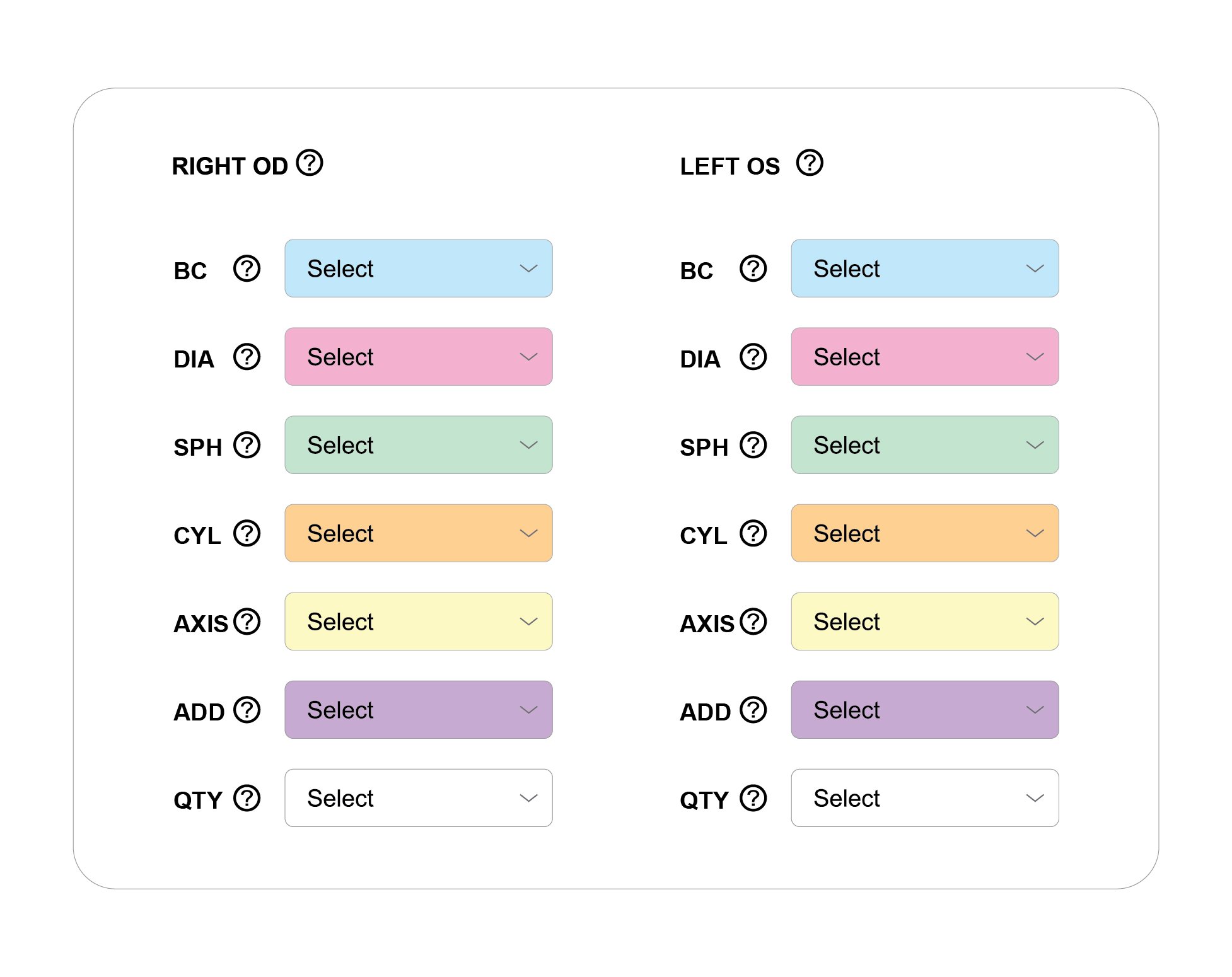
OD is an abbreviation for the Latin term oculus dexter which means right eye. Notice that the right eye information is asked for first even though we typically read from left to right.
OS is an abbreviation of the Latin oculus sinister which means left eye. That will be referenced on the far right column of the prescription.
B.C. is short for base curve measurement indicates the back curvature of your contact lens, in millimetres. This is important for comfort, as the BC of your contact lenses should match your eye's natural curve as closely as possible to ensure a better fit when you are wearing your contact lenses.
DIA is short for "diameter," or the distance from one edge of the contact lens to the other. This is measured in millimeters.
SPH is short for sphere. The sphere of your prescription indicates the power on the lenses that is needed to see clearly. A plus (+) symbol indicates the eyeglass wearer is farsighted. A minus (-) symbol indicates that the eyeglass wearer is nearsighted.
CYL is short for cylinder. The cylinder indicates the lens power necessary to correct astigmatism. If the column has no value (is blank), it indicates that the eyeglass wearer does not have astigmatism. If this is the case on your prescription, you can leave it blank when entering it in.
AXIS is a prescription will include an axis value for those with astigmatism. This number represents the angle of the lens that shouldn't feature a cylinder power to help correct your astigmatism.
ADD is short for "additional correction." This is where details about bifocals, multifocal lenses or progressive lenses would appear.
*Discount applied on the current website price at the time of order. Offer only valid for new customer first contacts order over $10. Maximum discount of $100. Cannot be combined with any other offers. Promotions are subject to change without notice. We reserve the right to cancel orders that are in breach of the terms and conditions of this offer.










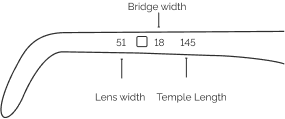
| Lens Width | Bridge Width | Temple Length | |
|---|---|---|---|
| XS | < 42 mm | < 16 mm | <=128 mm |
| S | 42 mm - 48 mm | 16 mm - 17 mm | 128 mm - 134 mm |
| M | 49 mm - 52 mm | 18 mm - 19 mm | 135 mm - 141 mm |
| L | >52 mm | >19 mm | >= 141 mm |
An eye doctor can spot the early warning signs of vision problems like glaucoma and macular degeneration, as well as other serious health conditions, such as diabetes and hypertension. Early detection is key.
The first time fit involves:
The doctor will review your history and get a feel for your needs. Your eyes will be measured and suitable candidates will receive a trial pair of lenses.
An experienced contact lens teacher will provide thorough instructions of the proper techniques for the insertion, removal and disinfection of your lenses. Your teacher will also explain the importance of hygiene, your daily regimen and replacing your contact lenses on time.
A slit lamp is used to assess the lens coverage, centration and movement. The slit lamp will also help the doctor see if there are any issues in terms of comfort with the lenses themselves.
Generally within 1 week of the initial visit, you will see the doctor for a follow up to insure the proper fit and level of vision correction. At this point, your prescription will be finalized and valid, and you can begin to order your replacement contact lenses online.
If you want to change your brand of lenses or renew your contact lens prescription, you have to schedule another contact lens fitting or renewal. It may require less steps and cost less than your first time
You should have an eye exam every 2 years or sooner, as your eye doctor may have already advised you. The contact lens portion of your prescription typically needs to be renewed yearly. Even if your prescription numbers have not changed, it is necessary to get an annual contact lens eye exam to evaluate the health of your eyes while wearing lenses. These rules have been put in place to promote good eye health and prevent complications that may arise from contact lens wear.
If you just need to replace your old contact lenses, try to schedule a "contact lens evaluation" and bring one of your remaining fresh pairs of contact lenses to the visit. Explain to your doctor that you're not a first time wearer, and that you need an updated copy of your prescription so you can throw out your old lenses and order new ones. You should not have to redo the contact lens teach or another full exam unless your doctor believes you may have been abusing your lenses or tells you it is necessary.
Do not continue to wear your old lenses. Most doctors will agree that its unhealthy to continue wearing the same pair of old contacts!
The "contact lens evaluation" also known as a "contact lens refit" or "contact lens renewal" or "contact lens exam" could potentially be billed separate from a full eye exam. In most cases, the doctor's office should bill less than half the cost of a full eye exam if you're only doing the contact lens evaluation to obtain new replacement contacts.
If you can't afford a full eye exam or prefer to wait until you are eligible for insurance, tell your doctor you want to be billed for a contact lens follow up only, so you can replace your old contacts. Everyone gets a "full" eye exam by default, so talk to your doctor's office if your budget does not permit.
The money that you save ordering your contact lenses from Kits.ca would be well spent on eye check ups.